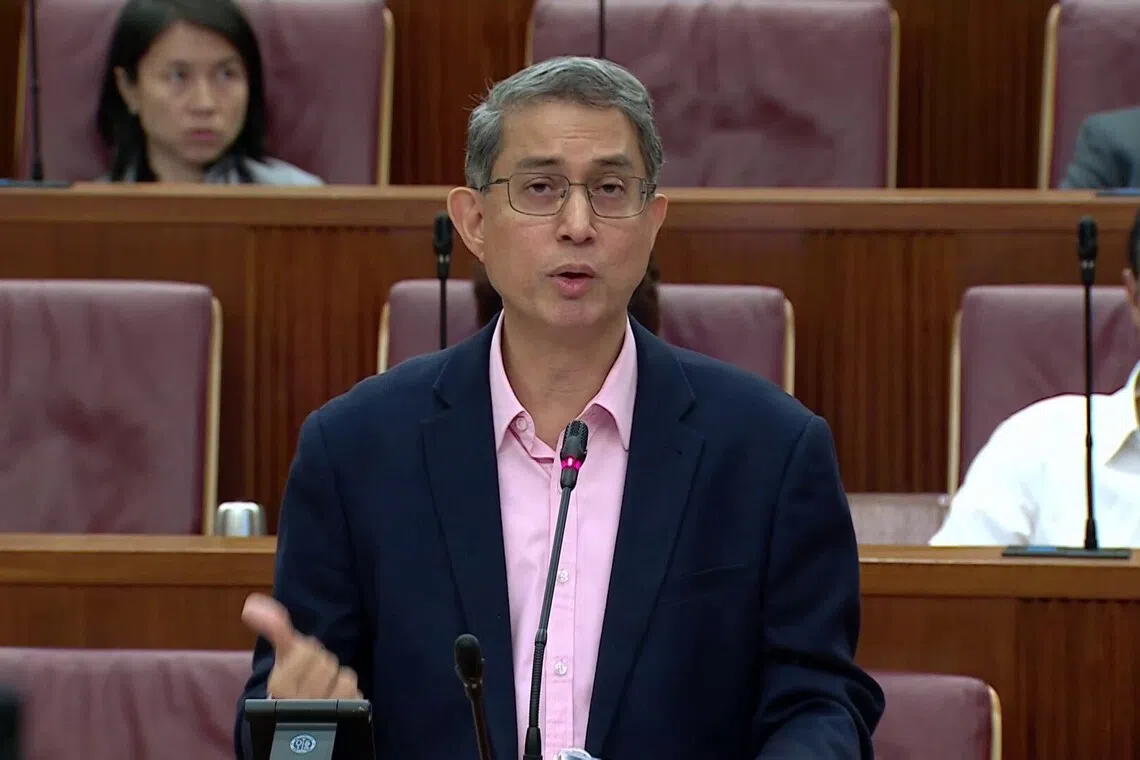Improving economic outcomes, celebrating Malay culture to support Malay/Muslim community: Faishal
Sign up now: Get ST's newsletters delivered to your inbox

Acting Minister-in-charge of Muslim Affairs Faishal Ibrahim speaking in Parliament on Sept 23.
PHOTO: MDDI
- Singapore will focus on improving Malay/Muslim social and economic outcomes, supporting faith in a multi-cultural society, and preserving Malay arts and heritage.
- Key initiatives include strengthening families, investing in youth, equipping workers, supporting seniors, building more prayer spaces, and developing religious leaders.
- Wisma Geylang Serai will be developed as a cultural hub, and Kampong Glam’s heritage will be strengthened to preserve and showcase Malay culture.
AI generated
SINGAPORE - To build a stronger future for Singapore’s Malay/Muslim community, efforts will be focused on three areas in the coming years, said Acting Minister-in-charge of Muslim Affairs Faishal Ibrahim.
Among these are improving social and economic outcomes for Malay/Muslims here, and supporting the community in practising its faith in a multicultural society, he said during the debate on the President’s address in Parliament on Sept 23.
The third is to preserve and celebrate the richness of Malay arts, culture and heritage, Associate Professor Faishal said, adding that the efforts of Malay/Muslim MPs to support the community will be focused on these areas.
To chart a stronger future for the community while contributing to the Republic’s multiracial and multi-religious society, Prof Faishal said he would deepen the collaborations between the Islamic Religious Council of Singapore (Muis), self-help group Mendaki and the People’s Association Malay Activity Executive Committees Council, Malay/Muslim and Indian/Muslim organisations, and the Government.
“As the Acting Minister-in-charge of Muslim Affairs, I hope to build on the good work of my predecessors and fellow community leaders,” he said.
Prof Faishal, who was appointed to the role in May, identified four focus areas to improve social and economic outcomes – nurturing strong families, investing in children and young people, equipping workers to seize growth opportunities, and supporting seniors in ageing with dignity.
With efforts to strengthen marriages making progress, and the number of Muslim divorces falling by 30 per cent between 2019 and 2023, more will be done in this area, he said.
The enrolment of children into pre-school will also be encouraged, in addition to efforts to sustain their attendance, said Prof Faishal, who is also Senior Minister of State for Home Affairs.
The education of children in primary and secondary schools must also be better supported, including after school hours, he said.
“Outside of school, we will equip our youth to deal with the challenges of the future. Beyond the academics, we will also support them with career guidance, personal development opportunities, and exposure to new experiences,” he said.
A Malay/Muslim Youth Taskforce, announced in July, will advocate the aspirations of youth in the community and help to create initiatives in support of the national SG Youth Plan – a five-year plan to support the aspirations, needs and interests of young people here.
“I hope that these efforts will position our youth to seize new opportunities in our fast-evolving economic landscape. The workforce in the years to come will look very different from today, and our workers must be prepared to ride the waves of growth in the future economy,” he said.
This would require cultivating a culture of lifelong learning, supported by the partnerships between the labour movement, Mendaki and other Malay/Muslim organisations, said Prof Faishal.
Community platforms to complement national-level programmes to support workers will be developed, he added.
“In particular, I hope that more of our workers can tap opportunities in growth sectors like advanced manufacturing, technology and professional services like finance,” he said.
In supporting the needs of seniors, Prof Faishal pointed to the Santunan Emas programme by Al-Muttaqin Mosque in Ang Mo Kio – which provides support in the form of religious, physical and social activities for the elderly – as a “commendable effort”.
“Let us continue to explore new ways to collaborate with various partners in support of our seniors,” he said.
In catering to the community’s religious needs, Prof Faishal identified three focus areas, including the need for more prayer spaces, particularly in newer residential areas.
To meet these needs, ways to speed up the completion of upcoming mosques in the Tampines North and Tengah areas are being explored, while the provision of interim prayer spaces is being studied to accommodate congregants while other mosques are being upgraded.
As the world becomes more complex, the future Singapore College of Islamic Studies will help to groom religious leaders who are attuned to global changes while appreciating the local context, he said.
The college will welcome an initial intake of up to 60 students in 2028, operating at a temporary location on the Muis campus in Bencoolen Street until the college’s Rochor campus is completed.
Religious institutions must also develop the capabilities to guide the community in contemporary issues, said Prof Faishal.
Recent fatwas, or Islamic religious rulings, on issues such as cultivated meat and alternative proteins have helped the community to tackle questions about food technology and environmental sustainability, he noted.
“These rulings exemplify how our Fatwa Committee and asatizah (religious teachers) can provide guidance that is both religiously sound and practically relevant,” Prof Faishal added.
“We will continue to empower our asatizah to guide the community in these complex issues, and, in so doing, deepen trust in our religious institutions.”
To showcase the vibrancy of Singaporean Malay culture and preserve its cultural traditions, community hub Wisma Geylang Serai will be developed as Singapore’s first social, arts and cultural heritage hub “where culture is not just preserved but also experienced”, he said.
“The National Heritage Board is also partnering with community and precinct stakeholders in Kampong Gelam to strengthen its distinctive cultural identity and heritage value,” Prof Faishal said, noting that this is in addition to the reopening of the Malay Heritage Centre in the precinct in April 2026.
Prof Faishal said his team has set an ambitious agenda based on engagements and consultations with the community, which will constantly be refined through further discussions.
“We will also need new ways of organising ourselves, so that we can better bring in our Malay/Muslim organisations, Indian/Muslim organisations and other community groups to address the three focus areas that I have outlined,” he said.



